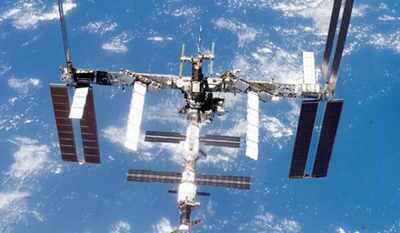Penalties against Russia imposed by the United States and other countries might lead the International Space Station to collapse, according to the president of Russia’s space agency, Roscosmos, who called for the sanctions to be repealed.
According to Dmitry Rogozin, the sanctions, some of which date back to Moscow’s invasion of Ukraine, have the potential to affect the functioning of Russian spacecraft that provide services to the International Space Station.
As a consequence, the Russian portion of the station — which is responsible for correcting the station’s orbit — might be impacted, resulting in the 500-tonne structure “falling down into the sea or onto land,” according to the head of Roscosmos on Twitter.
“The Russian section is responsible for ensuring that the station’s orbit is adjusted (on average 11 times a year), which includes avoiding space junk,” said Rogozin, who has often expressed his support for the Russian troops in Ukraine on social media platforms.
He pointed out that Russia was unlikely to be among the regions where the International Space Station may potentially come down in a map he published showing possible landing sites for the space station.
While he proceeded, he characterised the nations that imposed sanctions against Roscosmos as “insane,” saying that the inhabitants of other countries, particularly those governed by “dogs of war,” should consider the cost of sanctioning Roscosmos.
When Rogozin took to Twitter last month to denounce Western sanctions, he made a similar ominous statement about the possibility of the space station crashing to the planet.
NASA said on March 1 that it was attempting to find a method to maintain the International Space Station (ISS) in orbit without the assistance of Russia.
The Soyuz spacecraft is responsible for transporting crews and supplies to the Russian section.
The rocket that was utilised for take-off, according to Rogozin, has been “under US sanctions since 2021 and under European Union and Canadian sanctions since 2022.”
Roscosmos said it had written to NASA, the Canadian Space Agency, and the European Space Agency, “demanding the withdrawal of unlawful restrictions against our firms.” It also wrote to the United States Space Administration and the Canadian Space Agency.
The space sector is one of the few remaining sectors in which the United States and Russia continue to work together on joint projects.
The Russian space agency, Roscosmos, declared at the beginning of March that it intends to prioritise the building of military satellites as a response of Russia’s growing isolation as a result of the conflict in Ukraine.
Rogozin also said that Russia will no longer be supplying the engines for the United States Atlas and Antares rockets, as previously reported.
Allow them to sail into space on their broomsticks, he said in his letter.
On March 30, a Soyuz spacecraft carrying one American astronaut, Mark Vande Hei, and two Russian cosmonauts, Anton Shkaplerov and Pyotr Dubrov, is planned to return to Earth from the International Space Station.

